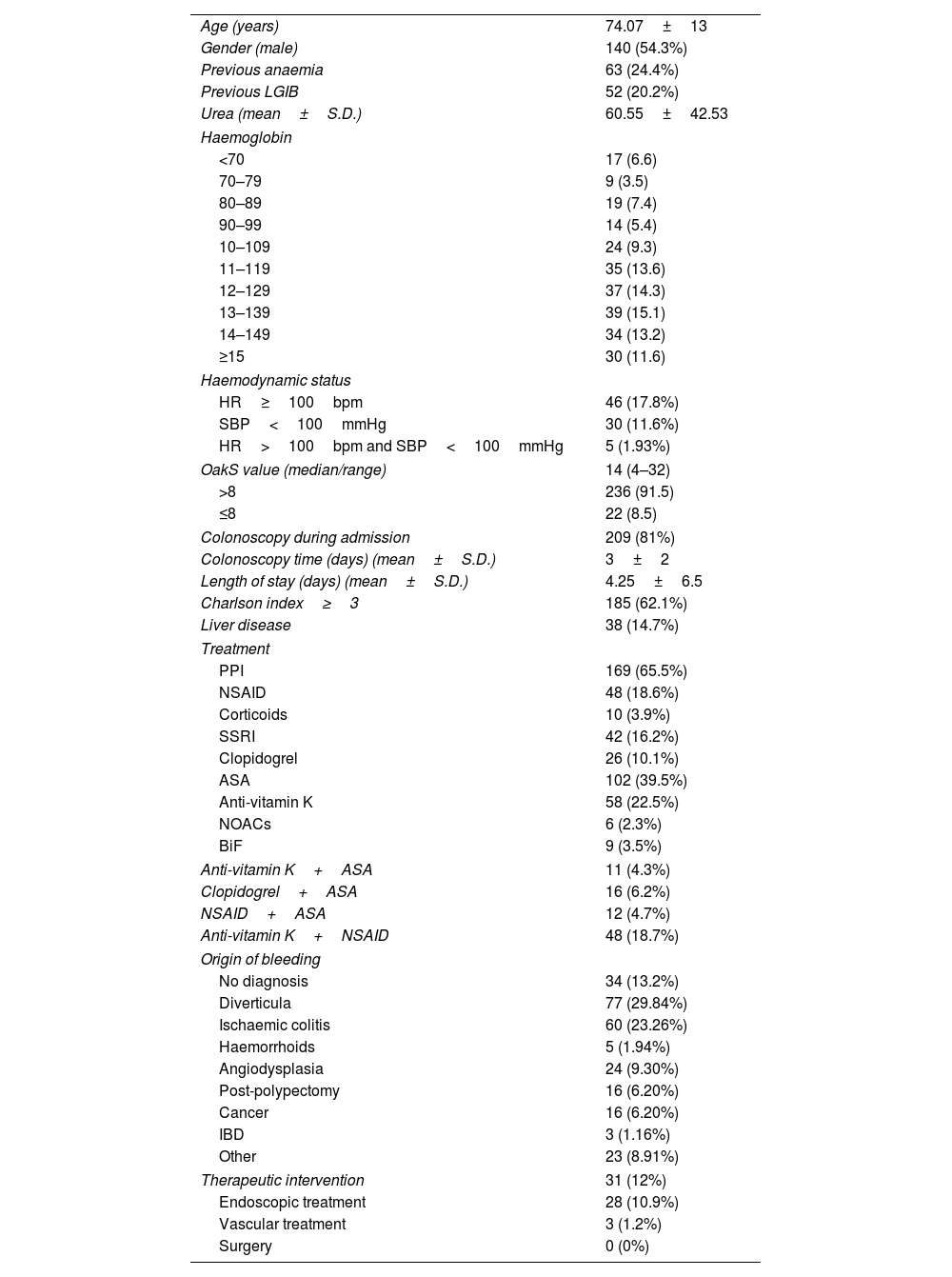Acute lower gastrointestinal bleeding (ALGIB) is a common cause of hospitalization. Recent guidelines recommend the use of prognostic scales for risk stratification. However, it remains unclear whether risk scores are more accurate than some simpler prognostic variables.
ObjectiveTo compare the predictive values of haemoglobin alone and the Oakland score for predicting outcomes in ALGIB patients.
DesignSingle-centre, retrospective study at a University Hospital. Data were extracted from the hospital's clinical records. The Oakland score was calculated at admission. Study outcomes were defined according to the original article describing the Oakland score: safe discharge (the primary Oakland score outcome), transfusion, rebleeding, readmission, therapeutic intervention and death. Area under the receiver operating characteristics (AUROC) curve and accuracy using haemoglobin and the Oakland score were calculated for each outcome.
ResultsTwo hundred and fifty-eight patients were included. Eighty-four (32.6%) needed transfusion, 50 (19.4%) presented rebleeding, 31 (12.1%) required therapeutic intervention, 20 (7.8%) were readmitted and six (2.3%) died. There were no differences in the AUROC curve values for haemoglobin versus the Oakland score with regard to safe discharge (0.82 (0.77–0.88) vs 0.80 (0.74–0.86), respectively) or to therapeutic intervention and death. Haemoglobin was significantly better for predicting transfusion and rebleeding, and the Oakland score was significantly better for predicting readmission.
ConclusionIn our study, the Oakland score did not perform better than haemoglobin alone for predicting the outcome of patients with ALGIB. The usefulness of risk scores for predicting outcomes in clinical practice remains uncertain.
La hemorragia digestiva baja (HDB) aguda es una causa frecuente de hospitalización. Guías recientes recomiendan el uso de escalas pronósticas para la estratificación del riesgo. Sin embargo, aún no está claro si los índices de riesgo son más precisos en cuanto a pronóstico que algunas variables más simples.
ObjetivoComparar el valor predictivo aislado de la hemoglobina con el índice pronóstico de Oakland para predecir resultados en pacientes con HDB.
DiseñoEstudio retrospectivo unicéntrico realizado en un hospital universitario. Los datos se extrajeron de las historias clínicas del hospital. La puntuación del score de Oakland se calculó en el momento del ingreso. Los resultados a valorar en el estudio se definieron igual que el artículo original que describe el índice de Oakland: alta segura (el resultado primario del score de Oakland), transfusión, resangrado, reingreso, intervención terapéutica y muerte. Para cada resultado se calcularon el área bajo la curva (AUROC) y la precisión utilizando la hemoglobina y el índice de Oakland.
ResultadosSe incluyeron 258 pacientes. Ochenta y cuatro (32,6%) necesitaron transfusión, 50 (19,4%) presentaron resangrado, 31 (12,1%) requirieron intervención terapéutica, 20 (7,8%) reingresaron y 6 (2,3%) fallecieron. No hubo diferencias en los valores de la curva AUROC de la hemoglobina frente al índice de Oakland con respecto al alta segura (0,82 [0,77-0,88] vs a 0,80 [0,74-0,86], respectivamente) ni a la intervención terapéutica y la muerte. La hemoglobina fue significativamente mejor para predecir transfusión y resangrado, y el índice de Oakland fue significativamente mejor para predecir reingreso.
ConclusiónEn nuestro estudio, el índice de Oakland no fue mejor que la hemoglobina aislada para predecir resultados en pacientes con HDB. La utilidad de los índices de riesgo para predecir resultados en la práctica clínica sigue siendo incierta.














